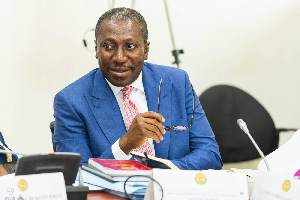A new organisation known as the Global Emerging Pathogens Treatment Consortium (GET) has been launched in Ghana to help find solutions to emerging infectious diseases in Africa.
The objective is to bring together like-minded and relevant experts, who are working in Africa, to provide some indigenous capacity, to collectively address the ever increasing menace of emerging and re-emerging dangerous infection diseases.
The GET consortium, working with international collaborators, with a goal of providing strategic recommendations and research capacity to respond to highly infectious emerging pathogens, as evidenced in the current Ebola outbreak, also creates a rapid, informed, response strategy and provides advice and guidance to organizations and stakeholders in African countries acting as a point of reference for international funding and aid agencies.
The launch attracted various stakeholders from industry, philanthropists, and clinicians among other key individuals within the Ghanaian health sector, science and research community to raise funding to support various research and other activities of the Consortium, to ensure health safety, not only for Africa, but globally.
Professor Akin Abayomi, the Co-Founder of GET, said the world is living in an era of emerging infectious diseases, which continue to threaten the existence of humans.
This, he explained, was as a result of the current overlapping of ecosystems of humans, animals and plants, as a result of massive encroachment on land space, leading to the transfer of pathogens from animals to human.
“Experts say if we do not do anything about this, human existence will be very difficult, especially in Africa”, Prof Abayomi, who is also a Hematologist, said.
He said the situation is more confounded as Africa lacks the effective means, as well as indigenous response of handling epidemics, unless they depend on international assistance.
He said the recent Ebola pathogen that plagued four African countries revealed Africa’s vulnerability in fighting such epidemics, and that is why such a consortium was so important. “The 2014 Ebola outbreak demonstrated the fact that global players were ill prepared to respond swiftly to outbreaks. When they do, there is a major “disconnect” between infrastructural necessities and local cultural expectations, which renders the response ineffective”.
“The Consortium seeks to fill that void by leveraging on their pool of consultants, who are experienced professionals at the top of their various fields and have served, and retain roots, both in western institutions and African countries”.
Prof Abayomi, therefore, advocated for greater awareness among African governments to enable them to develop effective policies, programmes and funding, while developing indigenous capacities to prevent the over-reliance on foreign expertise and donors.
He said the consortium was thus established first in Nigeria to help contain and restrain Ebola in that country whilst collaborating with the international community to harmonize response.
The GET also has secretariats in Ghana and the United States, with registration applications pending in Europe and South Africa and can currently boast of a professionally skilled and diverse membership drawn from 35 African countries.
Professor Kwadow Koram, the Director of Nugochi Memorial Institute for Medical Research, welcomed the setting up of the consortium that is ready to work find local solutions “to deal with our own situations”.
Professor Edmund Delle, a renowned Ghanaian Hematologist, said: “it is our duty to find solutions to our problems”, I therefore commend the initiators of GET.
Health News of Tuesday, 30 June 2015
Source: GNA
Consortium launched to address infectious diseases
Entertainment











